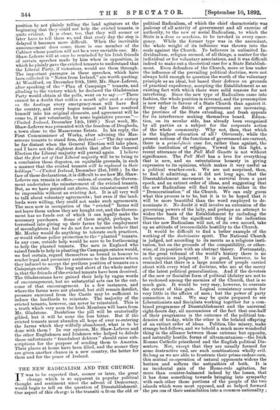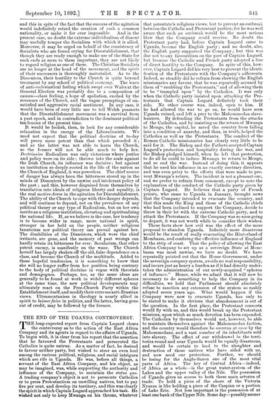THE NEW RADICALISM AND THE CHURCH.
IT was to be expected that, sooner or later, the great change which is so apparent in popular political thought and sentiment since the advent of Democracy, would begin to tell on the question of Disestablishment. One aspect of this change is the transiti 'n from the old or political Radicalism, of which the chief characteristic was jealousy of all activity of government and all exercise of authority, to the new or social Radicalism, to which the State is a dews ex machina, to be invoked in every emer- gency. While the former type was in the ascendant, the whole weight of its influence was thrown into the scale against the Church. To believers in unlimited In- dividualism, religion seemed, of all things, a matter for the individual or for voluntary associations, and it was difficult indeed to make out a theoretical case for a State Establish- ment. Even defenders of the Church, more or less under the influence of the prevailing political doctrine, were not always bold enough to question the worth of the voluntary principle as an ideal, but based their defence on grounds of practical expediency, accepting the Establishment as an existing fact with which there were solid reasons for not interfering. Since the new type of Radicalism came into fashion, the whole position is reversed, and the presumption is now rather in favour of a State Church than against it. Every day the duties of government are increasing, the province of the State extending, and fresh appeals for its interference making themselves heard. Educa- tion, on its secular side, has already been recognised by all parties as a subject for the corporate action of the whole community. Why not, then, that which is the highest education of all ? Obviously, while the present notions of the functions of government are current, there is a prima -facie case for, rather than against, the public institution of religion. Viewed in this light, a recent utterance of the Pall Mall Gazette is not without significance. The Pall Mall has a love for everything that is new, and an ostentatious honesty in giving expression to its opinions, which makes it very useful as a. political weather-cock. We are not surprised, then, to find it admitting, as it did not long ago, that the Disestablishment movement is a survival from a past epoch, and an extinct order of ideas, and suggesting that the new Radicalism will find its mission rather in the " Democratisation " of the Church. We can only guess what this process is to be, but it is to be hoped that it will be more beautiful than the word employed to de- nominate it. No doubt it will involve an extension of the governing powers of the laity, and perhaps an attempt to widen the basis of the Establishment by including the Dissenters. But the significant thing is the indication that the new Radicalism will not, of its own accord, take up an attitude of irreconcilable hostility to the Church. It would be difficult to find a better example of the working of the doctrinaire spirit. The National Church is judged, not according to its merits as a religious insti- tution, but on the grounds of the compatibility, or other- wise, of its position with an abstract theory. Fortunately, in the great tribunal of the world's history there is no such capricious judgment. It is good, however, to be reminded that there is a large number of people carried about with every wind of doctrine, who are at the mercy of the latest political generalisation. And if the devotees of the new or Socialist form of political idolatry are not to be reckoned among the enemies of the Church, that is so much gain. It would be very easy, however, to overrate the extent of this gain. Logical consistency counts for very little in the affairs of men • but the power of party connection is real. We may ire quite prepared to see Liberationists and Socialists working together for a com- bined programme of Disestablishment and the universal eight-hours day, all unconscious of the fact that one-half of their programme is the outcome of the political ten- dencies of to-day, while the other is the belated offspring of an extinct order of ideas. Politics, like misery, make strange bed-fellows, and we behold a much more wonderful thing in the alliance between those extreme but opposite, and naturally hostile, forms of ultramontanism—the Irish Roman Catholic priesthood and the English political Dis- senters. Nor, except that they are usually formed for some destructive end, are such combinations wholly evil. So long as we are able to frustrate their prime endeavours, this mutual co-operation of natural opponents widens the horizon and softens the antipathies of both. It is an incidental gain of the Home-rule agitation, far more than counter-balanced indeed by the losses, that it has done something towards bringing into sympathy with each other those portions of the people of the two islands which were most opposed, and so helped forward the process of their assimilation into a common nationality ; and this in spite of the fact that the success of the agitation would indefinitely retard the creation of such a common nationality, or make it for ever impossible. And in the present case, no doubt the extreme individualism of dissent may usefully temper the Socialism with which it is allied. Moreover, it may be urged on behalf of the consistency of Socialists who are found crying for Disestablishment, that though they are ready enough to make use of the State for such ends as seem to them important, they are not likely to regard religion as one of these. The Christian Socialists are no longer at the head of the movement, and the spirit of their successors is thoroughly materialist. As to the Dissenters, their hostility to the Church is quite beyond treatment by any school of political economy. The wave of anti-ecclesiastical feeling which swept over Wales at the General Election was probably due to a composition of causes—class feeling, a hope of spoliation, excited by the revenues of the Church, and the vague promptings of un- satisfied and aggressive racial sentiment. In any case, it would have been of very little use to tell Welsh peasants that the Disestablishment movement was a survival from a past epoch, and in contradiction to the dominant political tendencies of the present time.
It would be foolish, then, to look for any considerable relaxation in the energy of the Liberationists. We need not expect that the political doctrine of to-day will prove more potent than that which preceded it ; and as the latter was not able to harm the Church, so the former will not be able much to help her. Doctrinaire Radicalism was only victorious where justice and policy were on its side ; thrown into the scale against the Irish Church, its influence was decisive ; but against an institution so deeply-rooted in the life of the nation as the Church of England, it was powerless. The chief source of danger has always been the bitterness stored up in the minds of Dissenters by the unwise and intolerant policy of the past ; and this, however disguised from themselves by translation into ideals of religious liberty and equality, is the real motive-force in the agitation for Disestablishment. The ability of the Church to cope with this danger depends, and will continue to depend, not on the prevalence of any political theory or any type of Radicalism, but on her own merits as a religious institution, elevating and spiritualising the national life. If, as we believe is the case, her tendency is to become wider in range, more national in spirit, stronger in her hold on the people, neither religious fanaticism nor political theory can prevail against her. The disabilities of the Dissenters, which were the chief irritants, are gone, and the memory of past wrongs can hardly retain its bitterness for ever. Secularism, that other potent enemy, is manifestly on the wane. The Church herself has largely shaken off the old, false dependence on a class, and become the Church of the multitude. Added to these hopeful tendencies, it is something to know that she will no longer suffer from her position being contrary to the body of political doctrine in vogue with theorists and demagogues. Perhaps, too, as the same ideas are generally to be found at work in widely different spheres at the same time, the new political developments may ultimately react on the Free-Church Party within the Establishment itself, and modify their extreme an ti-Erastian views. Ultramontanism in theology is nearly allied in spirit to laisser faire in politics, and the latter, having gone out of credit, may be followed by the former.



































 Previous page
Previous page